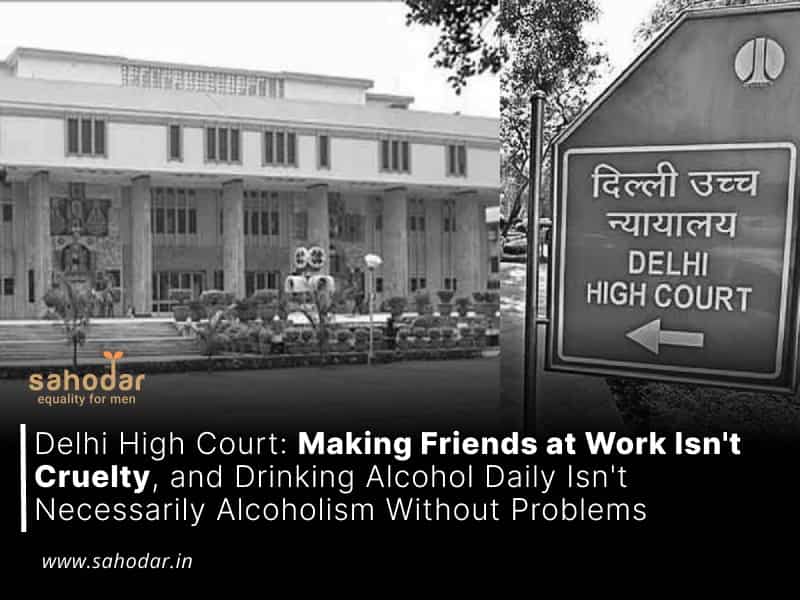The Delhi High Court has rendered a judgment delineating that the establishment of social connections, whether at the workplace or elsewhere, should not be construed as an act of cruelty, particularly in cases where a husband and wife are living apart due to occupational exigencies.
The Court underscored that individuals living in isolation may naturally seek companionship through friendships, and mere engagement with friends should not be deemed indicative of spouse neglect or cruel behavior.
This legal matter arose from the wife’s appeal contesting a family court’s decision to grant her husband a divorce on the grounds of desertion and cruelty.
The husband, an Army Officer subject to periodic relocations, contended that his wife exhibited no inclination to accompany him to his duty postings. He further contended that following their marriage, the wife initially resided with his parents at their matrimonial home and subsequently relocated to live with her own parents.
In response, the wife asserted that her husband harbored no intention of sustaining a marital relationship and deliberately refrained from seeking family accommodation during his posting in Kasauli.
Addressing the wife’s claim that her husband would withdraw and engage in prolonged phone conversations with friends, both male and female, when she visited him, the court opined:
“It has to be appreciated that both the parties having been essentially living separately because of their work exigencies, were bound to make friends at their place of work and otherwise; and such friendships without anything more, cannot be termed as cruelty.”
The bench partly modified the impugned order and set aside the divorce granted on the ground of desertion but, it upheld it on the ground of cruelty by wife.
On wife’s allegation that the husband was in a habit of consuming alcohol daily, the court said,
“Merely because a person consumes alcohol daily, does not make him an alcoholic nor does it add up to a bad character especially when there is no other incident asserted to have happened on account of consumption of alcohol by the respondent.”
The wife levied an allegation of the husband’s involvement in an adulterous relationship with another woman. In response, the court took cognizance of her testimony during cross-examination, wherein she affirmed her preparedness to cohabitate with the husband, notwithstanding his purported proclivity for excessive alcohol consumption, chain smoking, and association with another female individual.
“She, thus, acquiesced to this brief escapade of respondent and the appellant cannot claim advantage under Section 23 (1) (a) of the Act, 1955 as it cannot be held that the respondent is taking advantage of his own wrong,” the court said.
It added, “Once an act which lasted for a short while had been condoned, it cannot be taken as an act of cruelty while deciding the petition for divorce. The things could have been different had it been a turning point in the relations between the parties which otherwise also were not too platonic.”
Additionally, the bench underscored that the minor child had experienced complete estrangement and had been wielded as a weapon by the wife against the father.
The court observed that there is no greater anguish for a parent than witnessing their child’s profound alienation and staunch opposition to the father. It was duly recorded that the father consistently discharged his responsibilities towards the child, encompassing her educational and other requisites, and availed army facilities where available.
“The learned Principal Judge, Family Courts has, therefore, rightly concluded that such child alienation is an extreme act of mental cruelty towards a father who has never shown any neglect for the child,” the court said.
It added, “Once vindictiveness has crept in and the appellant had marched on to the war path filed only complaints in the Department but also initiated various civil/legal cases since 2011, i.e., for about 12 years and has even alienated the daughter from the respondent, it leads to irresistible conclusion that various acts of cruelty have been committed towards the respondent.”

